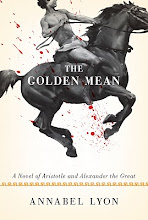Aristotle had children by two women: a daughter by his wife, Pythias, and a son by a woman named Herpyllis. Historians frequently refer to Herpyllis as Aristotle's concubine, a word that always struck me as unnecessarily fussy. A quick trip to the dictionary, though, reveals "concubine" to mean a companion a man can't or won't marry because of her inferior social status.
According to the 3rd century Roman historian Diogenes Laertius, Herpyllis came from Stageira, the village of Aristotle's birth. She was a slave or servant in Aristotle's household, likely one of Pythias's own maids. In The Golden Mean, I imagine she and Aristotle became intimate only after Pythias's death, though in reality who knows.
In creating the character of Herpyllis, I wanted a woman who would provide a foil to the quiet, inscrutable, sexually uneasy Pythias. I imagined her older than Pythias, earthier, and more self-assured. She's happy, illiterate, an excellent servant, and her sexual appetite is a match for Aristotle's. (In fact, I imagine her teaching him a thing or two, since medical texts of the time are entertainingly misguided about women and sex).
Herpyllis outlived Aristotle, as evidenced by his will:
"The executors...in memory of me and of the steady affection which Herpyllis has borne towards me, shall take care of her in every other respect and, if she desires to be married, shall see that she be given to one not unworthy; and besides what she has already received they shall give her a talent of silver out of the estate and three handmaids whomsoever she shall choose besides the maid she has at present and the man-servant Pyrrhaeus; and if she chooses to remain at Chalcis [where Aristotle died], the lodge by the garden, if in Stageira, my father's house. Whichever of the these two houses she chooses, the executors shall furnish with such furniture as they think proper and as Herpyllis herself may approve."
translation by R.D. Hick (Loeb Classical Library)
Happy Birthday, Kate!
11 hours ago

No comments:
Post a Comment